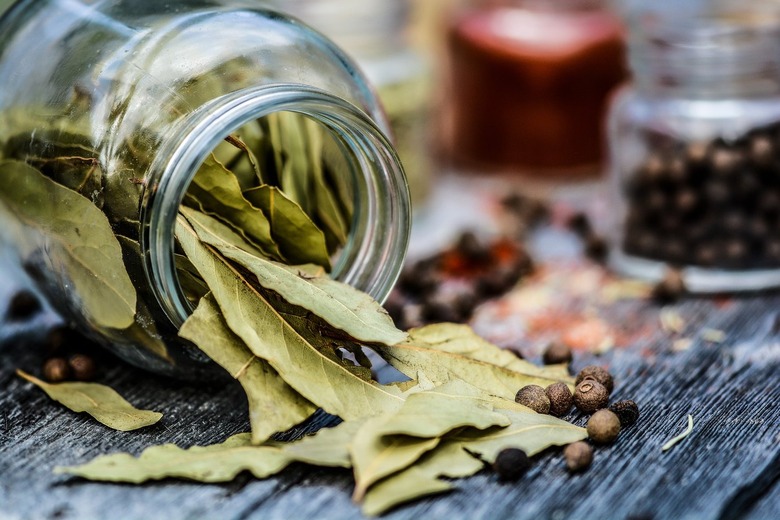Why Do People Put Bay Leaves In Pantries?
If you've ever opened up someone's pantry and spotted a few stray bay leaves lying around, it's (probably) not a sign that they're messy or chaotic when cooking. Surprisingly, bay leaves can actually be a form of pest control.
Pantries may be a wonderful storage solution in a kitchen, but when you keep food in there, you might end up with pests. Using bay leaves is just one of many preventative measures you can take to keep unwanted critters out of this area of the home.
Why do bay leaves deter pests?
Why do bay leaves deter pests?
Bay leaves are very fragrant — that's why humans use them in cooking — and there is evidence that some bugs don't like the smell.
"If the bay leaves are fresh and emitting a good amount of those botanical chemicals, there can be an invisible layer of these materials accumulating around the shelves of the pantry," Zachary Smith, president of Smith's Pest Management, tells Hunker, noting that the scent can ward off curious pests. "Because bay leaves are an edible plant product, harmless to humans, they are a very safe method of pest control in our food storage areas."
Will bay leaves eliminate a pre-existing pest problem?
Will bay leaves eliminate a pre-existing pest problem?
Unfortunately, bay leaves aren't a cure-all. "It is important to note that these types of natural remedies serve as minor repellents of pests. They are not going to be toxic to pests, nor will they eliminate a severe pest problem," says Smith.
Even worse, if you have a particularly bad infestation and you don't take additional measures to protect your food, bay leaves might be entirely useless. "For example, cockroaches can get used to the smell in a couple of days and keep crawling around your stuff as if nothing is wrong," says entomologist and pest control specialist Nicholas Martin, founder of Pest Control Hacks.
In other words, you'll want to take multiple steps to protect your food stored in a pantry before pests show up at all. Even more important than bay leaves? Ensuring all your food items are stored in containers with airtight seals. And if there are any spills, clean them up right away so that the food doesn't attract pests.
How should you prepare and arrange the bay leaves to prevent pests?
How should you prepare and arrange the bay leaves to prevent pests?
The more bay leaves you put into your pantry, the better. Both dry and fresh leaves work, but the latter is more effective. You can sprinkle them around your food storage containers, or you can hang garlands of bay leaves.
But keeping loose bay leaves in your pantry is not the most effective way to use them to repel pests. "When you are trying to use any plant as a repellent, you usually have to damage the leaves of the plant in some way," Wyatt West, a board-certified entomologist for Western Exterminator, tells Hunker. "It is not the bay leaves themselves that repel pests, but the chemical compounds that reside within them." Although whole leaves are sometimes pungent enough to ward off pests, you should crush the leaves to release the botanical compounds into the air for the most protection.
You can also extract essential oils from bay leaves and use those to repel pests, but West advises that this method should be reserved for professionals only. "Some essential oils can be dangerous if you do not know what you are doing. A number of them can have caustic effects," he says.
No matter how you're using bay leaves as a pest repellent in your pantry, you'll need to replace them sooner or later to keep up their efficacy. "Any time we're using a natural botanical product, it is diminishing in potency every day. The volatile oils and compounds in the leaves will be wafting through the pantry on a constant basis," says Smith. "When the leaves begin to get dry and brittle, or if you pick them up and smell them and they don't have a strong smell anymore, that is a good indication that it's time to swap them out for some fresher specimens!"
